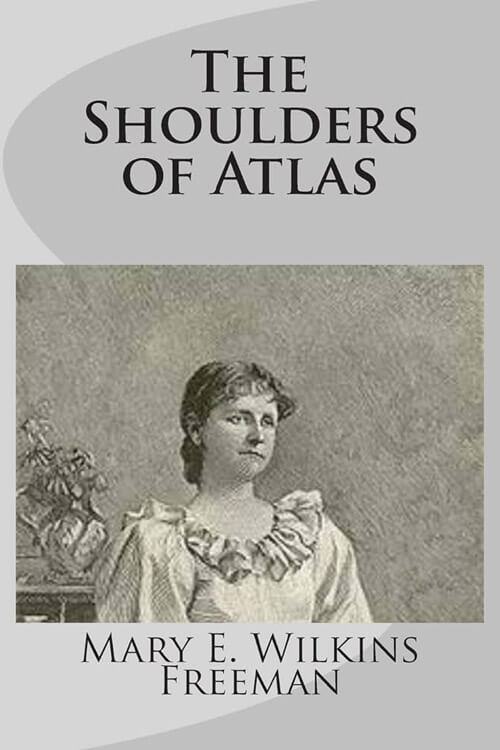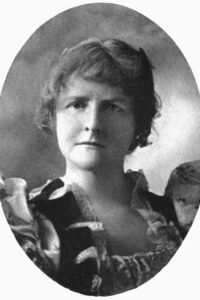
The Shoulders of Atlas, A Novel
Henry Whitman was walking home from the shop in the April afternoon. The spring was very early that year. The meadows were quite green, and in the damp hollows the green assumed a violet tinge—sometimes from violets themselves, sometimes from the shadows. The trees already showed shadows as of a multitude of bird wings; the peach trees stood aloof in rosy nimbuses, and the cherry trees were faintly a-flutter with white through an intense gloss of gold-green.
Henry realized all the glory of it, but it filled him with a renewal of the sad and bitter resentment, which was his usual mood, instead of joy. He was past middle age. He worked in a shoe shop. He had worked in a shoe shop since he was a young man. There was nothing else in store for him until he was turned out because of old age. Then the future looked like a lurid sunset of misery. He earned reasonably good wages for a man of his years, but prices were so high that he was not able to save a cent. There had been unusual expenses during the past ten years, too. His wife Sylvia had not been well, and once he had been laid up for six weeks with rheumatism. The doctor charged two dollars for every visit, and the bill was not quite settled yet.
Then the little house which had come to him from his father, encumbered with a mortgage as is usual, had all at once seemed to need repairs at every point. The roof had leaked like a sieve, two windows had been blown in, the paint had turned a gray-black, and the gutters had been out of order. He had not quite settled the bill for these repairs. He realized it always as an actual physical incubus upon his slender, bowed shoulders. He came of a race who were impatient of debt, and who regarded with proud disdain all gratuitous benefits from their fellow men. Henry always walked a long route from the shop to avoid passing the houses of the doctor and the carpenter whom he owed.
Once he had saved a little money; that was twenty-odd years before; but he had invested it foolishly, and lost every cent. That transaction he regarded with hatred, both of himself and of the people who had advised him to risk and lose his hard-earned dollars. The small sum which he had lost had come to assume colossal proportions in his mind. He used, in his bitterest moments, to reckon up on a scrap of paper what it might have amounted to, if it had been put out at interest, by this time. He always came out a rich man, by his calculations, if it had not been for that unwise investment. He often told his wife Sylvia that they might have been rich people if it had not been for that; that he would not have been tied to a shoe shop, nor she have been obliged to work so hard.
Read or download Book
Mary E. Wilkins
Mary Eleanor Wilkins Freeman (October 31, 1852 – March 13, 1930) was an American author.
Biography
Freeman was born in Randolph, Massachusetts on October 31, 1852, to Eleanor Lothrop and Warren Edward Wilkins, who originally baptized her “Mary Ella”. Freeman’s parents were orthodox Congregationalists, bestowing a very strict childhood. Religious constraints play a key role in some of her works.
In 1867, the family moved to Brattleboro, Vermont, where Freeman graduated from the local high school before attending Mount Holyoke College (then, Mount Holyoke Female Seminary) in South Hadley, Massachusetts, for one year, from 1870 to 1871. She later finished her education at Glenwood Seminary in West Brattleboro. When the family’s dry goods business in Vermont failed in 1873, the family returned to Randolph, Massachusetts. Freeman’s mother died three years later, and she changed her middle name to “Eleanor” in her memory.
Freeman’s father died suddenly in 1883, leaving her without any immediate family and an estate worth only $973. Wilkins returned to her hometown of Randolph. She moved in with a friend, Mary J. Wales, and began writing as her only source of income.
During a visit to Metuchen, New Jersey in 1892, she met Dr. Charles Manning Freeman, a non-practicing medical doctor seven years younger than she. After years of courtship and delays, the two were married on January 1, 1902. Immediately after, she firmly established her name as “Mary E. Wilkins Freeman”, which she asked Harper to use on all of her work. The couple built a home in Metuchen, where Freeman became a local celebrity for her writing, despite having occasionally published satirical fictional representations of her neighbors.[ Her husband suffered from alcoholism and an addiction to sleeping powders. He also had a reputation for driving fast horses and womanizing. He was committed to the New Jersey State Hospital for the Insane in Trenton and the two legally separated a year later. After he died in 1923, he left the majority of his wealth to his chauffeur and only one dollar to his former wife.
In April 1926, Freeman became the first recipient of the William Dean Howells Medal for Distinction in Fiction from the American Academy of Arts and Letters.
Freeman suffered a heart attack and died in Metuchen on March 15, 1930, aged 77. She was laid to rest in Hillside Cemetery in Scotch Plains, New Jersey.
Adolescence
As an adolescent, Freeman was increasingly caught between the need for her mother’s love and her instinct to avoid becoming her mother and subsiding into her mother’s form of passivity. Despite continuous pressure from her mother to participate in domestic chores, no amount of discipline could pull Mary away from her reading to the reality of hated kitchen work. According to Edward Foster’s biography of Freeman, “Disliking her household duties, she avoided them, nor could she be moved by disciplinary tactics.” It is clear that a growing tension between Mary and her mother centered on her resistance to undertaking the tasks expected of a “good girl.”
As the years passed, the contrast between Mary and her sister, Anna, became apparent. While her sister Anna willingly undertook domestic work and increasingly met her parents’ expectations, Mary quietly began to reject them. She would resist her mother’s world of domesticity throughout her entire life. Her story, “The Revolt of Mother” is especially significant in this context, for the story seems to have been written as a tribute to her mother’s work, a form of work she had never valued in her mother’s lifetime.






